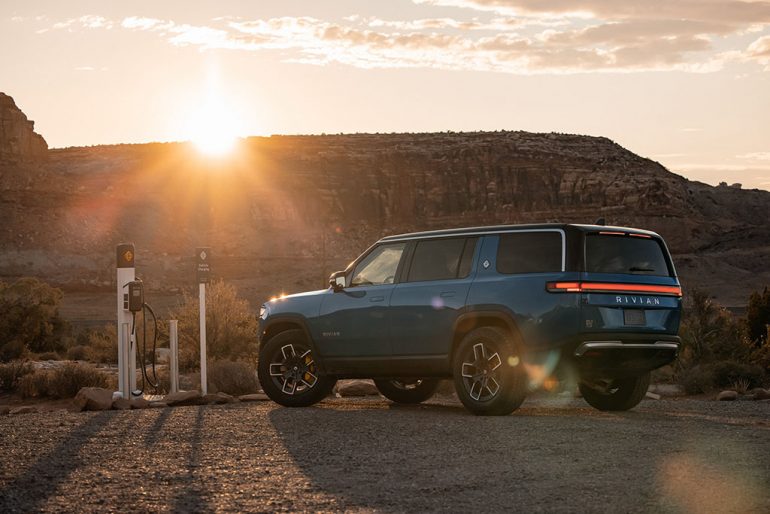
The hits keep on coming when it comes to automotive manufacturers jumping on the Tesla train to adopt their North American Charging Standard (NACS), which will eventually give new EVs access to utilize the vast Tesla Supercharging network. It’s now inevitable that Tesla NACS will be ‘the standard’ for EV charging as Rivian has recently announced its decision to adopt Tesla’s charging standard. By embracing Tesla’s charging standard, Rivian aims to contribute to the establishment of a unified industry standard, while also benefiting from the largest charging network in the United States.
Rivian’s customers, who currently have access to a limited network of fast chargers, will now be able to utilize over 12,000 Tesla Superchargers in the United States and Canada starting from the spring of 2024. To facilitate this compatibility, Rivian plans to equip its vehicles with a Tesla-style charging port, which will become a standard feature on its vehicles from 2025 onward.
This decision follows similar agreements made by Tesla with other major automakers such as General Motors and Ford. Through these partnerships, Tesla enables other manufacturers to utilize its charging infrastructure, allowing the company to profit from selling power to a larger community of electric vehicle drivers.
In response to the announcement, Rivian’s stock experienced a 3% increase in premarket trading. Meanwhile, Tesla’s shares, which had already risen by more than 40% since the announcement of its collaboration with Ford, saw a 0.5% increase.
Establishing reliable charging infrastructure is crucial for automakers to address customers’ concerns about range anxiety. While most automakers, excluding Tesla, have refrained from constructing their own charging networks due to the substantial investment required and limited returns, Tesla has taken a different approach, resulting in its Superchargers representing approximately 60% of the fast chargers available in the United States.
For Tesla, revenue from services and other sources, including the fees associated with using Superchargers, accounted for just under 10% of its total revenue in the last quarter. Although the precise charging revenue figures are not disclosed separately, Tesla’s charging network plays a significant role in its overall business model.
Rivian CEO RJ Scaringe emphasized the benefits of this collaboration, highlighting that buyers of Rivian’s electric pickup trucks and SUVs will be able to leverage Tesla’s expansive Supercharger network.
Tesla has made notable progress in supplanting the rival Combined Charging System (CCS) standard, which previously had support from the Biden administration. The Biden administration has pledged $7.5 billion in funding to expedite the deployment of EV chargers across the United States, and Tesla’s involvement required the company to open its network for charging.
The moveby Tesla has garnered support from various manufacturers and operators of CCS chargers, such as ABB E-mobility North America, Tritium DCFC, EVgo, and FreeWire, who have promptly announced the inclusion of NACS plugs in their charging stations following the partnerships with Ford and GM.
While Rivian plans to continue expanding its own charging network, which is set to include over 3,500 charging stations, it has recognized the value of collaborating with Tesla to provide enhanced charging capabilities to its customers. In other regions, such as China and Japan, different charging standards have been established to cater to the respective markets’ needs.
Overall, Rivian’s decision to adopt Tesla’s charging standard reflects a growing trend of collaboration and standardization within the electric vehicle industry, aiming to enhance convenience for customers and promote the widespread adoption of electric vehicles.

Mike Floyd is a finance executive by trade and a car enthusiast at heart. As a CFO with a keen eye for detail and strategy, Mike brings his analytical mindset to the automotive world, uncovering fresh insights and unique perspectives that go beyond the surface. His passion for cars—especially his favorite, the Porsche 911, fuels his contributions to Automotive Addicts, where he blends a love for performance and design with his professional precision. Whether he’s breaking down industry trends or spotlighting emerging innovations, Mike helps keep the site both sharp and forward-thinking.